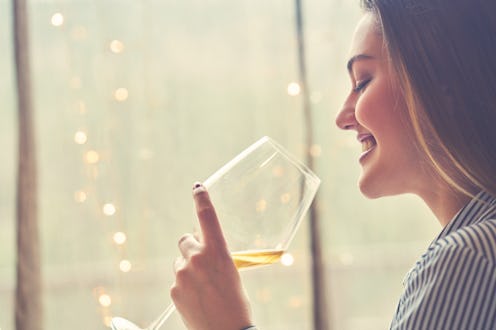Life
If Your Body Has These 7 Reactions, You May Not Want To Drink Alcohol At Night

There's nothing like unwinding with a glass of wine after a week that never seemed to end. But you might want to re-think that late night drink if you're noticing that you aren't feeling great the next day. Experts say that the effects of drinking at night are something to consider if your body has specific reactions. Beyond the pesky hangover, drinking excessively in the evenings can affect your body in ways that will have you passing on that night cap.
The National Institute on Alcohol Abuse and Alcoholism reports, "According to the 2015 National Survey on Drug Use and Health (NSDUH), 86.4 percent of people ages 18 or older reported that they drank alcohol at some point in their lifetime." Chances are you've encountered a drink or two in the evening after work and through the weekend. But when is it time to stop?
Drinking later into the evening is when your body could experience reactions. Listen to your literal gut. Registered nutritionist Liz Wyosnick, MS, RDN tells Bustle, "For many people, that one glass of wine with dinner may provide pleasant, and relaxing relief, but saying yes to a second glass of wine may disturb sleep significantly. What's more — the premise of a 'nightcap' is false. The alcohol late in the evening may help you fall asleep, but not stay asleep." Drinks too late can result in your body not getting the crucial regenerative rest it needs. And that can lead to a slew of other reactions that indicate you shouldn't be drinking in the evening.
1Waking Up From Sleep
If drinking is interrupting your precious zzz's then you should consider not drinking in the evenings. Wyosnick says, "When the liver metabolizes alcohol, i.e. works through the detoxification of the substance, it can lead to a waking sensation because alcohol has calories (though no nutrients), and typically a surge in energy from calories ingested, means it is time to put it to use." All that energy could be confusing your body. Even though you're pretty sure you're not ready to start the day your body could be thinking otherwise.
2Night Sweats
If you're sleeping too hot, that could be because of that last bottle of beer. "The liver metabolizing alcohol may also lead to warming for some people, and they may be prone to night sweats along with their waking," Wyosnick says. "Everyone metabolizes alcohol at different speeds, but if you find yourself waking in the middle of the night (4-5 hours) after you went to bed, you may want to cut down on the volume of alcohol at night, and ensure your drinks are not too late to allow the liver to metabolize the substance prior to bed." Alcohol takes time to break down in the system. If you're drinking too late in the evening it could result in those dreaded night sweats.
3Constipation
It is crucial for your system to drink water. The more alcohol you intake the harder it might be to poop, and constipation could lead to uncomfortable situations. "At night, while sleeping and breathing normally, we lose a lot of water — 1-2 liters," Wyosnick says. "If you go to bed dehydrated after a few drinks and no water, that can set the stage for a headache in the morning and sluggish digestion." If you're finding it hard to pass a bowel movement, re-think your evening drink of choice. Tea or water could be your best bet.
4Headache
That throbbing feeling in your head can be blamed on evening drinking. Dehydration caused by intaking too much alcohol and not getting enough water, as Wyosnick says, could mean you should stop drinking in the evenings. If your body is reacting to alcohol with a string of these, you should consider skipping the last few glasses of wine and opting instead for a chamomile tea.
5Redness
Look closely into the mirror the next morning after drinking in the evening. The answers could be in your reflection. "Alcohol is dehydrating and can therefore reduce moisture in your skin and also increase puffiness in areas like around the eyes," NYC Dermatologist Dr. Hadley King tells to Bustle. "It also causes peripheral vasodilation of blood vessels, which can make your skin red and over time can lead to visible telangiectasias, or what people commonly call 'broken blood vessels.'" It could also lead to pesky break outs.
6Diarrhea
If constipation isn't your problem, you might be on the opposite side of the spectrum. According to nutritionist Lisa Richards, "The most immediate effect of drinking alcohol, particularly for those with a weakened microbiome, is diarrhea. If your gut is reacting badly to alcohol, you might find that you need to run to the bathroom once or twice during the evening. This is a sign that your gut is out of balance, and a clear indicator that you should be cutting back on your alcohol consumption." Evening drinking could meddle with your gut health which can lead to some uncomfortable side effects.
7Excessive Gas Or Peptic Ulcers
Dr. Laura Catena, physician and fourth generation Argentine vintner tells Bustle, "Drinking in the evening can provoke or worsen gastritis or peptic ulcer disease." However, she offers, there are ways to minimize risks of this effect. Dr. Catena says, "when alcohol is consumed with food and at a slow pace, gastric side effects are minimized. Combining wine and food is the key." Food allows the alcohol to metabolize, allowing you to avoid any harsh side effects. But if you're struggling with ulcers and relentless belches, perhaps it's worth not drinking into the evening.
Relieving the day with friends at a social happy hour is common. But for the sake of personal wellness it's important to know when to stop. Especially if you know your body is going to react in a way that'll leave you feeling uncomfortable for the following day.